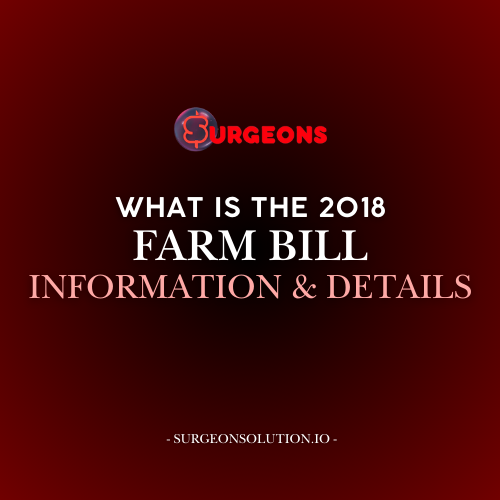Discover our carefully crafted product, designed with quality materials and attention to detail. Perfect for everyday use or special occasions.
Surgeons Online Cannabinoid Academy
What Is the 2018 Farm Bill: Information & Details
Introduction
The 2018 Farm Bill marked a turning point for the U.S. agricultural sector, particularly for hemp and CBD industries. By legalizing hemp cultivation and removing it from the Controlled Substances Act, the bill paved the way for a booming market of hemp-derived products, including CBD. That isn't all there is, though! There are over 540 different cannabinoids that the farm bill affects. This guide explores the key provisions of the 2018 Farm Bill, its impact on the hemp industry, and what it means for consumers and businesses.
What is the 2018 Farm Bill?
The Farm Bill is a comprehensive legislative package passed every five years to address agriculture, nutrition, and rural development policies in the U.S. The 2018 version, officially known as the Agricultural Improvement Act of 2018, introduced groundbreaking changes by legalizing hemp cultivation nationwide.
Hemp was defined as a cannabis plant containing no more than 0.3% THC by dry weight, separating it from marijuana, which remains federally illegal. This distinction allowed hemp to be treated as an agricultural commodity, enabling its legal production, research, and distribution.
Impact of the 2018 Farm Bill on Hemp
The 2018 Farm Bill declassified hemp as a Schedule I substance, effectively legalizing its cultivation and use for industrial purposes. This change opened the door for:
- Hemp Cultivation: Farmers can now legally grow hemp with proper licensing.
- Hemp-Derived Products: Products like CBD oils, textiles, and food supplements became federally legal, provided they meet THC limits.
- Interstate Commerce: The bill explicitly protects the transportation of hemp across state lines, ensuring a national market.
These provisions have driven significant growth in the hemp industry, creating new opportunities for farmers and businesses alike.
CBD and the 2018 Farm Bill
While the Farm Bill legalized hemp and its derivatives, including CBD, its implementation is subject to state-level regulations. Some states impose stricter rules on CBD products, such as requiring medical prescriptions or limiting their sale.
Additionally, the FDA oversees CBD’s inclusion in food and beverages, maintaining that CBD cannot be marketed as a dietary supplement or added to consumables without approval. These regulatory complexities highlight the importance of understanding both federal and state laws when purchasing or selling CBD products.
Economic and Agricultural Benefits
The 2018 Farm Bill has spurred economic growth by expanding the hemp market. Key benefits include:
- New Revenue Streams: Farmers and manufacturers have tapped into the growing demand for hemp-derived products.
- Job Creation: The expanding hemp industry has generated jobs in cultivation, processing, and retail.
- Research Opportunities: Legalization has facilitated studies into hemp’s potential for sustainability and health applications.
These developments underscore the Farm Bill’s role in revitalizing the agricultural economy and fostering innovation in the hemp sector.
Challenges and Controversies
Despite its achievements, the 2018 Farm Bill has faced criticism and challenges:
- Regulatory Uncertainty: Ambiguities in state and federal laws have created enforcement inconsistencies.
- FDA Oversight: The FDA’s stance on CBD in food and supplements has stymied market growth.
- THC Compliance Issues: Farmers and producers must navigate strict THC limits, with non-compliance leading to crop destruction or legal penalties.
These challenges highlight the need for clearer regulations and ongoing dialogue between industry stakeholders and policymakers.
Conclusion
The 2018 Farm Bill represents a landmark achievement for hemp and CBD industries, transforming the legal landscape and unlocking new opportunities for growth and innovation. By understanding its provisions and staying informed about related laws and regulations, consumers and businesses can navigate this dynamic market responsibly. Explore the potential of hemp and CBD while advocating for continued progress and clarity in cannabis legislation.
Introduction
- Overview of the 2018 Farm Bill and its significance.
- Importance of understanding its impact on hemp and CBD industries.
What is the 2018 Farm Bill?
- Explanation of the Farm Bill as a federal legislative package.
- Key provisions of the 2018 version and its focus on hemp legalization.
Impact of the 2018 Farm Bill on Hemp
- Legalization of hemp and hemp-derived products in the U.S.
- Differentiation between hemp and marijuana based on THC content.
CBD and the 2018 Farm Bill
- Legal status of CBD under the Farm Bill.
- State-level variations and FDA regulations for CBD products.
Economic and Agricultural Benefits
- How the Farm Bill supports farmers and the U.S. economy.
- Opportunities created for hemp cultivation and production.
Challenges and Controversies
- Overview of regulatory hurdles and enforcement inconsistencies.
- Discussion of ongoing debates regarding CBD and hemp legality.
Conclusion
- Recap of the 2018 Farm Bill’s key points and its role in the hemp industry.
- Encourage readers to stay informed about related laws and updates.


